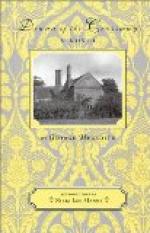Yet Lady Dunstane herself could name the bank of smoke, when looking North-eastward from her summerhouse, the flag of London: and she was a person of the critical mind, well able to distinguish between the simple metaphor and the superobese. A year of habitation induced her to conceal her dislike of the place in love: cat’s love, she owned. Here, she confessed to Diana, she would wish to live to her end. It seemed remote, where an invigorating upper air gave new bloom to her cheeks; but she kept one secret from her friend.
Copsley was an estate of nearly twelve hundred acres, extending across the ridge of the hills to the slopes North and South. Seven counties rolled their backs under this commanding height, and it would have tasked a pigeon to fly within an hour the stretch of country visible at the Copsley windows. Sunrise to right, sunset leftward, the borders of the grounds held both flaming horizons. So much of the heavens and of earth is rarely granted to a dwelling. The drawback was the structure, which had no charm, scarce a face. ’It is written that I should live in barracks,’ Lady Dunstane said. The colour of it taught white to impose a sense of gloom. Her cat’s love of the familiar inside corners was never able to embrace the outer walls. Her sensitiveness, too, was racked by the presentation of so pitiably ugly a figure to the landscape. She likened it to a coarse-featured country wench, whose cleaning and decorating of her countenance makes complexion grin and ruggedness yawn. Dirty, dilapidated, hung with weeds and parasites, it would have been more tolerable. She tried the effect of various creepers, and they were as a staring paint. What it was like then, she had no heart to say.
One may, however, fall on a pleasurable resignation in accepting great indemnities, as Diana bade her believe, when the first disgust began to ebb. ‘A good hundred over there would think it a Paradise for an asylum’: she signified London. Her friend bore such reminders meekly. They were readers of books of all sorts, political, philosophical, economical, romantic; and they mixed the diverse readings in thought, after the fashion of the ardently youthful. Romance affected politics, transformed economy, irradiated philosophy. They discussed the knotty question, Why things were not done, the things being confessedly to do; and they cut the knot: Men, men calling themselves statesmen, declined to perform that operation, because, forsooth, other men objected to have it performed on them. And common humanity declared it to be for the common weal! If so, then it is clearly indicated as a course of action: we shut our eyes against logic and the vaunted laws of economy. They are the knot we cut; or would cut, had we the sword. Diana did it to the tune of Garryowen or Planxty Kelly. O for a despot! The cry was for a beneficent despot, naturally: a large-minded benevolent despot. In short, a despot to obey their bidding. Thoughtful young people who think through the heart soon come to this conclusion. The heart is the beneficent despot they would be. He cures those miseries; he creates the novel harmony. He sees all difficulties through his own sanguine hues. He is the musical poet of the problem, demanding merely to have it solved that he may sing: clear proof of the necessity for solving it immediately.




